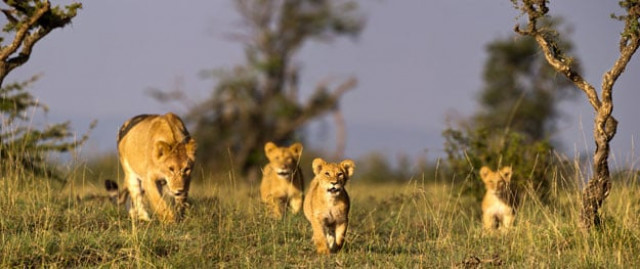Lion population in Africa likely to fall by half: study
Scientists say there is 67% chance that number of lions in Central, West Africa would drop by half within two decades

A lion and her cubs at the Masai Mara Game Reserve in Kenya. Severe declines in many African countries could put at risk the lion’s role as “king of the jungle.” PHOTO: Nick Garbutt
The study, which analyzed data from 47 of the 67 African lion populations totaling an estimated 8,221 lions, found pronounced reductions in West and Central African populations — in two national parks, Comoé and Mole, the animals appeared already to be extinct. There were less drastic but still substantial declines in the East African countries where lions have traditionally thrived.
Animal care: Babra Sharif adopts ailing lion cub
Over all, the African lion population in these regions has decreased by about 50 percent since 1993, said Luke Hunter, president of Panthera, an organization focused on the global conservation of big cats, and one of eight authors of the study, published this week in the journal Proceedings of the National Academy of Sciences.
In contrast, most populations in Southern Africa remained stable or even increased over the same time period; an exception was a large population in the Okavango Delta, in Botswana, which declined.
Lion experts attributed the stability in southern countries to a lower density of humans, the establishment of fenced wildlife preserves that protect both lions and humans, and national policies that have given ownership of wildlife — and the profits from tourism or legal hunting — to landowners and communities.
 A lion in an umbrella acacia tree in Tanzania's Serengeti National Park. Scientists estimate that about 20,000 lions remain in all of Africa. PHOTO: Nick Garbutt
A lion in an umbrella acacia tree in Tanzania's Serengeti National Park. Scientists estimate that about 20,000 lions remain in all of Africa. PHOTO: Nick GarbuttHans Bauer, a lion researcher at Oxford University who led the study, said that the severe declines in many African countries put at risk the lion’s storied role as “king of the jungle.”
“We are losing all the populations which are characteristic of the pristine view of lions,” he said. “Lions roaming free, hunting wildlife across the savanna.”
The researchers said that the population declines they reported in the study were likely to be underestimates, because the analysis was limited to surveys and other samples from sites that were monitored by researchers and that provided lions at least some protection.
Varsity adopts Rosie the leopard cub
“If there is an overall bias in our results,” the researchers wrote, “it is probably toward optimism.”
About 20,000 lions remain in all of Africa, according to estimates. The scientists projected that there was a 67 percent chance that the number of lions in Central and West Africa would drop by half within two decades. In East Africa, where some populations, like the lions in Serengeti National Park, have remained stable, the probability was 37 percent.
The threats to the lion’s survival have grown along with the human population in many African nations.
The spread of subsistence farming has encroached on the woodlands, open plains and thick bush where lions hunt and breed. With human settlements and large predators living in proximity, lions are often killed in retaliation for attacks on livestock or humans. And a robust trade in bush meat has depleted the prey that the big cats depend on for survival.
“You start pulling at the threads of these big complicated ecosystems, and they start unraveling,” Dr Hunter said.
Poorly regulated trophy hunting has added to the problem in some countries. The death of Cecil, a lion killed in Zimbabwe this year by an American dentist and recreational big-game hunter, drew public outrage. But some lion experts said that hunting was a problem primarily in countries where corruption has infiltrated the industry. In places where the money from trophy hunting benefits people who live in the area, the practice can help conserve lions, by making it in communities’ interests to keep populations healthy.
Zimbabwe court says local Cecil hunter to face trial next month
“Wildlife is under so much pressure,” said Brian Child, a conservation economist at the University of Florida who was not involved in the study. “If we don’t get past ideology and get down to what works, we’re going to lose the whole lot.”
The researchers noted that most African countries did not have the resources to mount the type of conservation effort needed to protect lion populations from further decline, and several said that the West and other countries outside of Africa should share responsibility for saving the lions that remained.
“I think around the world that an awful lot of us would like to assure that the Serengeti survives,” said Craig Packer, a lion expert at the University of Minnesota who was also an author of the study.
He and others said they hoped the results, which were based on more reliable and sophisticated statistical techniques than previous findings, would persuade regulatory bodies to take account of the projected declines and regional differences in deciding how to categorize the African lion.
The International Union for Conservation of Nature lists the African lion as vulnerable rather than endangered, and it appears in Appendix II under the Convention on International Trade in Endangered Species, a category that includes species that are not yet threatened with extinction but may become so.
Lion kills guide in Zimbabwe park where Cecil lived
Last year, the United States Fish and Wildlife Service proposed to list the African lion as threatened, offering it some protection under the Endangered Species Act. A threatened listing would require a permit for the import of trophy lions by hunters, but under a rule also proposed by the agency, imports would be limited to trophy lions “from countries with a scientifically sound management plan for African lions,” according to the agency. A final decision on the listing must be made by Thursday.
Dr Packer said that in his view, the agency should list the African lion as endangered in all the countries outside of Southern Africa.
“They need to send a signal to these countries that they’ve got problems with their lions,” he said.
Vanessa Kauffman, a spokeswoman for the wildlife service, said the agency was “definitely looking into all the available new scientific information.”
“As the science comes in,” she said, “what ultimately ends up as a final determination can look different from what we proposed.”
This article originally appeared on The New York Times, a partner of The Express Tribune



















COMMENTS
Comments are moderated and generally will be posted if they are on-topic and not abusive.
For more information, please see our Comments FAQ